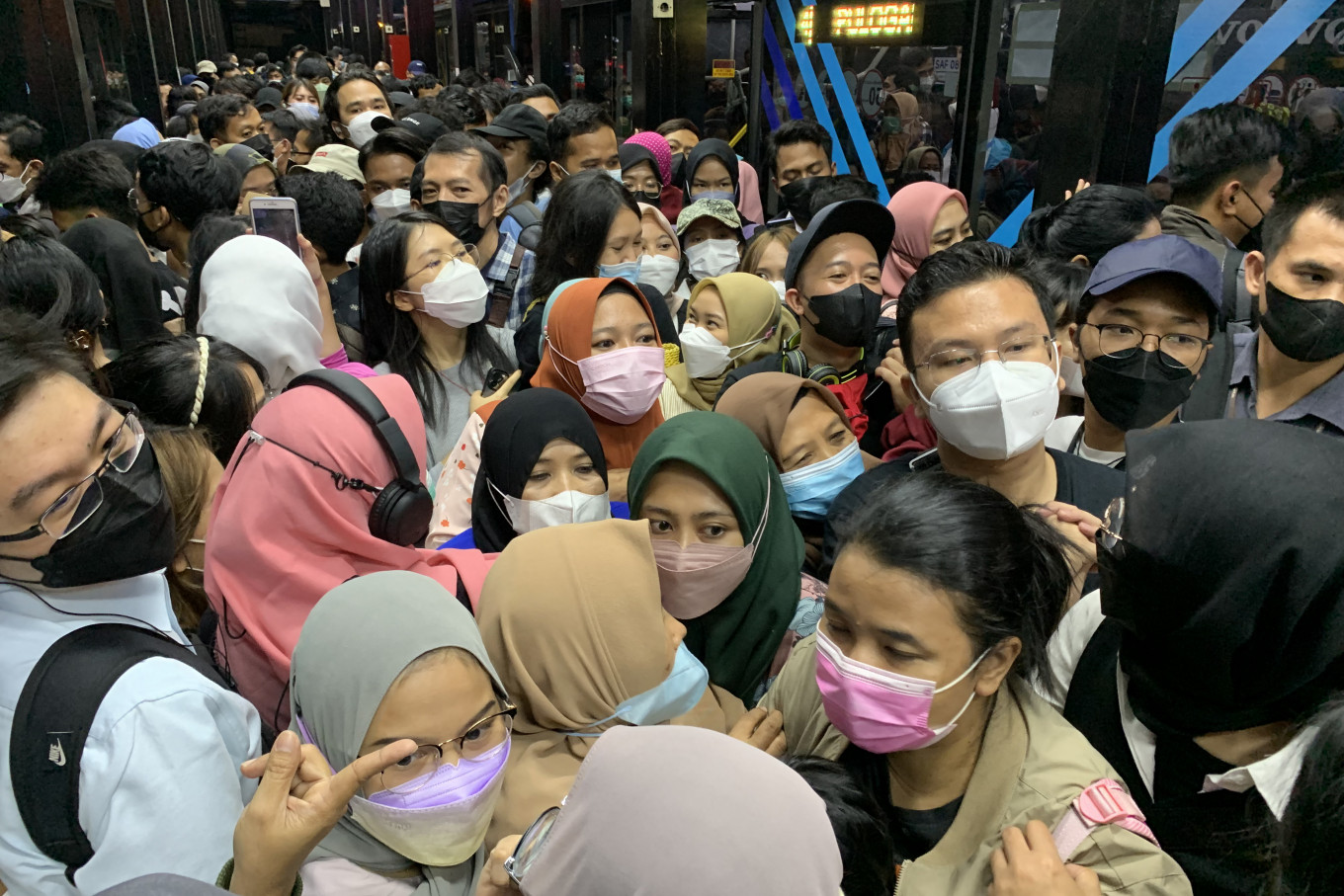Popular Reads
Top Results
Can't find what you're looking for?
View all search resultsPopular Reads
Top Results
Can't find what you're looking for?
View all search resultsCOVID-19 cases spike as fourth wave takes hold
Experts say more vaccinated people should get boosted.
Change text size
Gift Premium Articles
to Anyone
A
nother phase of the health crisis looms large as the country enters the fourth wave of COVID-19 infection, now driven by the highly contagious Omicron sub-variants.
Indonesia recorded 4,329 new infections on Saturday, the highest daily caseload since March 25, according to official data from the national COVID-19 task force. From July 10 to July 16, the country recorded 22,684 new cases, a 27.6 percent increase from the previous week with 16,426 new cases. It now has a total of 26,594 active cases.
While the figures may not accurately reflect the true scale of the current community infection due to a lack of adequate testing and contact tracing, they do indicate a significant increase in cases, experts say.
“It looks like we are entering the fourth wave. We really have to be very careful because the spike in cases cannot be underestimated,” Zubairi Djoerban, the head of the Indonesian Medical Association's (IDI) COVID-19 task force, told The Jakarta Post over the weekend. “We overcame this situation months ago, and Indonesia can be said to be quite successful compared with our neighboring countries, but this remains a threat.”
As of Saturday, the country’s weekly positivity rate was 11.7 percent, surpassing the World Health Organization’s benchmark of 5 percent.
Omicron sub-variants
The current wave of infection is believed to have been driven by the Omicron sub-variants – BA.4 and BA.5 – which were first detected in South Africa earlier this year. The two variants have been detected in at least 58 and 63 countries, respectively.
Read also: Indonesia detects first four cases of Omicron subvariants BA.4, BA.5
Preliminary data suggest that they are more contagious than the original strain of Omicron and have contributed to a surge of COVID-19 infections in several countries, including Australia, South Africa, Chile and Portugal.
Studies have found that the BA.4 and BA.5 subvariants can evade immunity from prior infection and vaccination, although there is no evidence yet indicating that they cause more severe symptoms.
Australia has decided to reinstate support payments for casual workers who have to quarantine due to COVID-19 as it battles the fresh outbreak driven by the BA.4 and BA.5 strains, Reuters reported Saturday.
"I want to make sure that people aren't left behind, that vulnerable people are looked after," Prime Minister Anthony Albanese said, as quoted by the news agency.
Low vaccination rate
Dicky Budiman, an epidemiologist from Australia’s Griffith University, said that despite BA.4 and BA.5's high transmissibility, it was unlikely the current wave would be more severe than the earlier ones.
On July 27, 2021, at the height of the Delta-driven second wave, the country saw more than 2,000 daily COVID-19 deaths. On March 8, the deadliest day of the Omicron-driven third wave, there were 401 COVID-19 deaths.
“In terms of severity, it tends to be lighter. This is not because the virus is weaker, but rather because of the community’s better immunity landscape,” he said.
That being said, the epidemiologist warned that the country would still need to work more to increase the immunity of its population given that only around 25 percent of the targeted population had received their third dose of vaccine.
Read also: Hesitancy hinders Indonesia's efforts to boost vaccination rates
The government is struggling to step up its vaccination drive, citing public hesitancy caused by an improving pandemic situation as the main hurdle. The nation’s monthly vaccine rollout has decreased by 83 percent in the past five months, from around 29.4 million doses administered in February to a mere 4.8 million last month.
Daily vaccine distribution, meanwhile, has significantly dwindled over the same period, from around 1 million shots administered nationwide a day to about 200,000 shots a day, the lowest since March of last year when Indonesia was still struggling with COVID-19 vaccine shortages.
Public health expert Tjandra Yoga Aditama warned that the current wave of infection would not be the last, saying that another Omicron sub-variant, BA2.75, had been found in 10 countries and could drive another virus outbreak.
No tightening of curbs yet
Despite a spike in cases, nationwide hospitalizations remain low (about 3 to 4 percent), with most patients experiencing mild or no symptoms.
The government has yet to increase the level of public activity restrictions (PPKM) despite the case spike in Jakarta, the epicenter of the current wave. Of the 4,324 cases recorded on Saturday, nearly half were located in the capital.
On July 5, just four days before the Islamic holiday of Idul Adha (Day of Sacrifice), the Home Ministry raised the PPKM level in the capital from level 1 to level 2, but revoked the decision the day after. It is unclear if it will maintain the current PPKM level as cases surge.
Read also: Govt reinstates booster shot rule for domestic travelers
While the pandemic curb level remains unchanged, the government has included booster shots in the checklist for domestic travel as part of efforts to ramp up the country’s stalling vaccination rollout amid the recent uptick in COVID-19 cases.
President Joko “Jokowi” Widodo has also reminded the public to wear masks in both indoor and outdoor settings.
COVID-19 has infected more than 6 million people and killed more than 150,000 people in Indonesia since it recorded its first cases on Jan. 3, 2020. (ahw)










